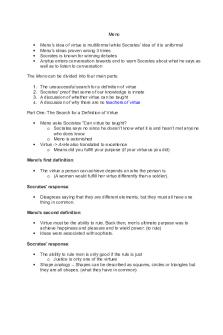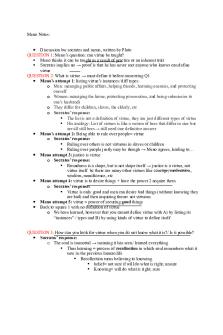Meno Summary - Lecture notes 1-5 PDF

| Title | Meno Summary - Lecture notes 1-5 |
|---|---|
| Course | Introduction To Philosophy: Great Thinkers |
| Institution | Boise State University |
| Pages | 4 |
| File Size | 105.2 KB |
| File Type | |
| Total Downloads | 18 |
| Total Views | 154 |
Summary
This gives a summary of the dialogue Meno which you will be required to read for the first 3 weeks or so of George Knight's PHIL 102 class....
Description
Meno
Meno’s idea of virtue is multiformal while Socrates’ idea of it is uniformal Meno’s ideas proven wrong 3 times Socrates is known for winning debates Anytus enters conversation towards end to warn Socrates about what he says as well as to listen to conversation
The Meno can be divided into four main parts: 1. The unsuccessful search for a definition of virtue 2. Socrates' proof that some of our knowledge is innate 3. A discussion of whether virtue can be taught 4. A discussion of why there are no teachers of virtue Part One: The Search for a Definition of Virtue
Meno asks Socrates “Can virtue be taught? o Socrates says no since he doesn’t know what it is and hasn’t met anyone who does know o Meno is astonished Virtue -> Arete also translated to excellence o Means did you fulfill your purpose (if your virtuous you did)
Meno's first definition:
The virtue a person can achieve depends on who the person is. o (A woman would fulfill her virtue differently than a soldier).
Socrates' response:
Disagrees saying that they are different elements, but they must all have one thing in common.
Meno's second definition:
Virtue must be the ability to rule. Back then, men’s ultimate purpose was to achieve happiness and pleasure and to wield power. (to rule) Ideas were associated with sophists.
Socrates' response:
The ability to rule men is only good if the rule is just o Justice is only one of the virtues Shape analogy – Shapes can be described as squares, circles or triangles but they are all shapes. (what they have in common)
Meno's third definition:
Virtue is the desire to have and the ability to acquire fine and beautiful things.
Socrates' response:
Everyone desires what they think is good o People desire different things so it must reflect their ability to acquire certain things o Things can be acquired in good or bad ways Meno defines virtue with virtue
Part Two: Is Some of Our Knowledge Innate?
Meno declares himself utterly confused and is speechless at Socrates
Meno's paradox:
Basically, says that if we don’t know what we are looking for, how can we find it. Socrates says that the soul is immortal and during the process of reincarnation, the soul gains all knowledge. Therefore, when we “learn” we are just recollecting ideas. o Theory of Recollection
The slave boy demonstration:
Meno asks Socrates to prove that the Theory of Recollection applies to all situations o Slave – no mathematical training to double the area of a square o Says to double the length of sides and then to increase one side length by 50%... Both incorrect Slave and Meno stunned but its better that they realize they are wrong o Socrates guides boy saying to use the diagonal of the square as the basis Stats at the end the boy had some mathematical knowledge, it just had to be stirred o This theory is speculative even according to Socrates, but many see it as convincing proof that humans have some priori knowledge since the boy recognized the logic in the conclusion o Socrates isn’t sure on Theory of Reincarnation, but he argues the pursuit of knowledge is better then lazily assuming we don’t need to try finding it
Part Three: Can Virtue Be Taught?
Meno asks Socrates to return to their original question: Can virtue be taught? Socrates comes up with points:
o Virtue is something beneficial; it's a good thing to have o All good things are only good if they are accompanied by knowledge or wisdom (for example, courage is good in a wise person, but in a fool, it is mere recklessness) o Therefore, virtue is a kind of knowledge o Therefore, virtue can be taught Argument not convincing. Just because something beneficially good is accompanied by wisdom, it doesn’t mean it is virtuous However, addressing virtue as a knowledge is a common theme in Plato’s philosophy Basically, someone who’s virtuous in life will know their purpose and will fulfill it. o Someone who’s not virtuous will not know what to search for and therefore will not fulfill their purpose o “Virtue is knowledge” or “All wrongdoing is ignorance”
Part Four: Why Are There No Teachers of Virtue?
Socrates turns on own argument saying that if virtue could be taught then there would be teachers and there aren’t. Anytus joins conversation and dismisses the thought of sophists because they corrupt anyone who listens o Anytus brings up Athenian Gentlemen o Socrates states that Pericles Themistocles and Aristides were good man and they taught their songs skills. However, they didn’t teach them how to be virtuous by themselves which they would’ve if they could’ve Anytus leaves telling Socrates to watch what he’s saying about people Socrates decides to fix no teacher issue by distinguishing between real knowledge and correct opinion Socrates explains tomato farming o To believe you’ll grow tomatoes a certain way, you’ll have a good outcome o To teach someone how to grow tomatoes, you have to know tricks and rules to help them. The good men who don’t teach their sons virtue are like the belief gardeners. They can do it themselves, but they can’t teach it to others. Their opinions may not always be reliable as well. Socrates believe men acquire virtue as a gift from the gods, similar to the ability to write poetry and understand how.
Phaeto
Socrates no longer believes in reincarnation but that the soul goes on to learn unattainable knowledge as a human Theory of Recollection meaning people recall ideas, not that we are “learning.” o The Forms: The Equal, Beautiful, Good and Size The Forms can’t be sensed from 5 senses but are through our perceptions and sensations. Socrates is dying this night by execution by poison drinking...
Similar Free PDFs

Meno Summary - Lecture notes 1-5
- 4 Pages

Meno Notes
- 3 Pages

Chapter 15 - Lecture Summary
- 8 Pages

Lecture notes 2-15
- 22 Pages

Plankton - Lecture notes 15
- 7 Pages

Lithosphere - Lecture notes 15
- 3 Pages

Diagnostic - Lecture notes 15
- 21 Pages

Chapter 15 Lecture Notes
- 24 Pages

Bba112 - Lecture notes 15
- 68 Pages

Lecture 15 - Sedimentary notes
- 3 Pages

Lectures 11-15 - Lecture notes 12-15
- 11 Pages
Popular Institutions
- Tinajero National High School - Annex
- Politeknik Caltex Riau
- Yokohama City University
- SGT University
- University of Al-Qadisiyah
- Divine Word College of Vigan
- Techniek College Rotterdam
- Universidade de Santiago
- Universiti Teknologi MARA Cawangan Johor Kampus Pasir Gudang
- Poltekkes Kemenkes Yogyakarta
- Baguio City National High School
- Colegio san marcos
- preparatoria uno
- Centro de Bachillerato Tecnológico Industrial y de Servicios No. 107
- Dalian Maritime University
- Quang Trung Secondary School
- Colegio Tecnológico en Informática
- Corporación Regional de Educación Superior
- Grupo CEDVA
- Dar Al Uloom University
- Centro de Estudios Preuniversitarios de la Universidad Nacional de Ingeniería
- 上智大学
- Aakash International School, Nuna Majara
- San Felipe Neri Catholic School
- Kang Chiao International School - New Taipei City
- Misamis Occidental National High School
- Institución Educativa Escuela Normal Juan Ladrilleros
- Kolehiyo ng Pantukan
- Batanes State College
- Instituto Continental
- Sekolah Menengah Kejuruan Kesehatan Kaltara (Tarakan)
- Colegio de La Inmaculada Concepcion - Cebu




